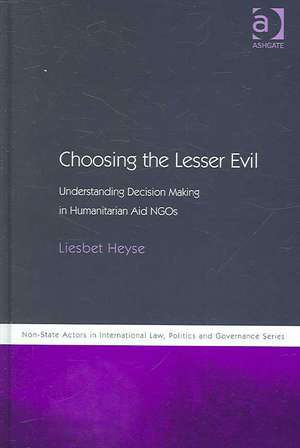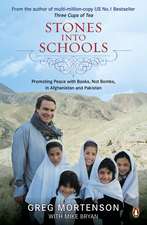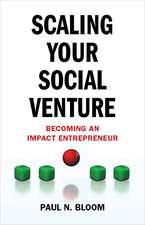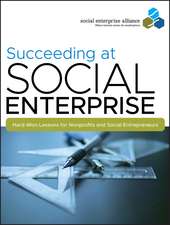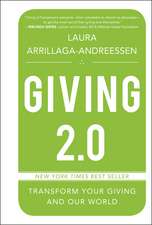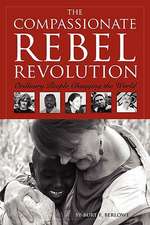Choosing the Lesser Evil: Understanding Decision Making in Humanitarian Aid NGOs: Non-State Actors in Global Governance
Autor Liesbet Heyseen Limba Engleză Hardback – 28 ian 2007
Preț: 1000.27 lei
Preț vechi: 1219.84 lei
-18% Nou
Puncte Express: 1500
Preț estimativ în valută:
191.40€ • 200.34$ • 159.31£
191.40€ • 200.34$ • 159.31£
Carte tipărită la comandă
Livrare economică 31 martie-14 aprilie
Preluare comenzi: 021 569.72.76
Specificații
ISBN-13: 9780754646129
ISBN-10: 0754646122
Pagini: 252
Dimensiuni: 156 x 234 x 16 mm
Greutate: 0.45 kg
Ediția:1
Editura: Taylor & Francis
Colecția Routledge
Seria Non-State Actors in Global Governance
Locul publicării:Oxford, United Kingdom
ISBN-10: 0754646122
Pagini: 252
Dimensiuni: 156 x 234 x 16 mm
Greutate: 0.45 kg
Ediția:1
Editura: Taylor & Francis
Colecția Routledge
Seria Non-State Actors in Global Governance
Locul publicării:Oxford, United Kingdom
Recenzii
'In this fine book, Liesbet Heyse applies management decision-making theory to humanitarian organizations. She sheds new light on the understudied topic of management of humanitarian action. Strong in theory and rich in empirical detail, this book will be required reading for humanitarian practitioners and management scholars alike.' Dennis Dijkzeul, Ruhr University, Germany '...this empirically rich volume explores the often dramatic choices agencies have to make...By focusing on the organizational...aspects of humanitarian operations, the book makes a major contribution to opening up the black box of humanitarian organizations and reveals their internal dynamics and differences. Laying out decision-making models, the book can help humanitarian agencies to put their own strategies to the test and help them improve the life and death decisions they are dealing with.' Dorothea Hilhorst, Wageningen University, The Netherlands 'Liesbet Heyse has led the way in looking at the decision-making process of humanitarian NGOs.' Transnational Perspectives 'Liesbet Hayes has led the way in looking at the decision making process of humanitarian NGOs. There are probably not many differences due to national styles or religious convictions, but more studies along these lines would be welcome.' International Journal on World Peace '...an interesting source of inspiration for new research in this field...the information in the book will be useful to those who want to know about the internal dynamics of NGOs. It is, of course, relevant for academics and fundamental for donors and for other NGOs wanting to compare their experiences.' Administrative Science Quarterly '...the book is relevant to students, academics, and practitioners. It contains a wealth of useful information about how MSF Holland and ACT Netherlands function, and it clearly demonstrates that the decision-making processes are largely undertaken within the organizations which have access to financial resources, wi
Notă biografică
Liesbet Heyse is Assistant Professor at the School of Business, Public Administration and Technology at Twente University, The Netherlands. In addition, she holds a research position in the Department of Sociology/ICS at Groningen University, The Netherlands, where she participates in the Network of Humanitarian Action (NOHA). Liesbet Heyse's research focus is on the performance and operation of non-governmental humanitarian organizations.
Cuprins
Chapter 1 Choosing the Lesser Evil: Selecting Humanitarian Aid Projects; Part I NGO Decision Making in Theory; Chapter 2; Chapter 3 Opening the Black Box of Internal NGO Dynamics: An Organizational Decision-Making Perspective; Chapter 4 Towards the Reality of Humanitarian Aid Provision: Three Sketches of NGO Behavior; Part 2 MSF Holland Decision Making in Practice; Chapter 5 Traces of the Administrative Organization: MSF's Organizational Features; Chapter 6 Consequentiality in Aid Provision: MSF's Dominant Decision-Making Pattern; Chapter 7 Disagreement, Commitment, and Constraints: MSF's Secondary Decision-Making Patterns; Chapter 8 From Consequential to Garbage Can Decision-Making: Two Examples of MSF Aid Provision to Africa; Part III ACT Netherlands' Decision-Making in Practice; Chapter 9 The Opposite of the Administrative Organization: ACT Netherlands' Organizational Features; Chapter 10 Working With 'The Family': ACT's Dominant Decision-Making Pattern; Chapter 11 Working Outside 'The Family': ACT's Secondary Decision-making Patterns; Part IV Comparison and Conclusion; Chapter 12 Decison-Making Dynamics in MSF and ACT: Comparison and Discussion of Research Results; Chapter 13 A Look Beyond the Horizon: Identifying Steps towards Theoretical Generalization;
Descriere
How do non-governmental humanitarian aid organizations initiate, terminate and extend their project activities? Liesbet Heyse opens up the black box of NGO operations, providing an empirical account of organizational decision making amongst this increasingly important group of actors.
